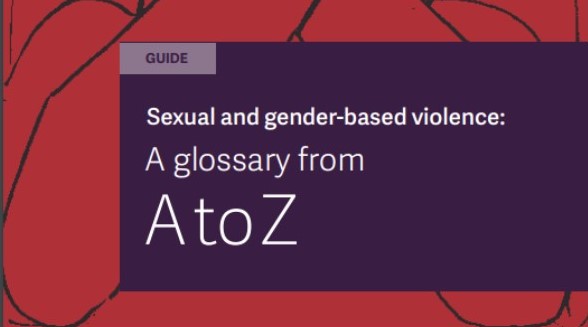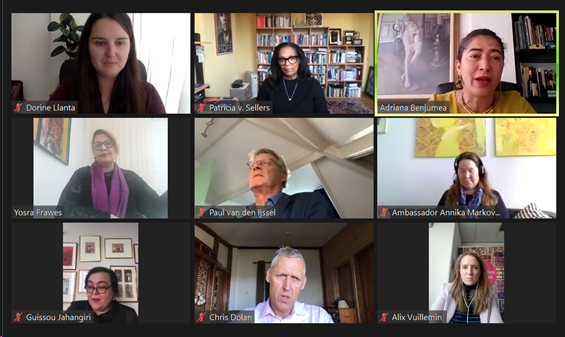
Glossary on Sexual and Gender-Based Violence, from A-to Z
November 25, 2020
The Glossary on Sexual and Gender-Based Violence, from A-to Z was presented in a conference on the occasion of the International Day to Eliminate Violence Against Women and the start of 16 Days of Activism against Gender-Based Violence. The A-to Z aims to shed light on 61 essential terms related to sexual and gender-based violence (SGBV), the context in which such crimes are committed, and the standards that must be respected when engaging with survivors.
The conference moderated by Dorine Llanta, Programme Officer at the Permanent Representation of FIDH to the ICC brought together a distinguished panel of institutional and practitioner speakers.

In her introduction, Ambassador of Sweden to the Netherlands and International Gender Champion in The Hague Annika Markovic, denounced Sexual and Gender-based Violence as a world-wide plague in full motion where impunity reigns, victim stigma is rampant and silence and taboos are hard to break. She highlighted the role of a courageous and daring civil society sometimes in spite of apathetic institutions and governments. She called on international experts to fully assume their responsibility to create a framework and sustain tools allowing individuals and organizations understand and fight SGBV. Markovic praised the Glossary as a new tool to identify and combat domestic abuse in a gender and child responsible approach. And useful for all stakeholders, from the grassroot to governmental and international levels as part of an agenda for change, to strengthen Women’s Rights, but also the rights of all victims of SGBV.
Guissou Jahangiri FIDH Vice President and Director of OPEN ASIA|Armanshahr, highlighted the universalist value of the fight against SGBV and all forms of violence, with a poem from the 12th century Persian poet Saadi of Shiraz:
“Human beings are members of a whole,
in creation of one essence and soul.
If one member is afflicted with pain,
other members uneasy will remain.
If you have no sympathy for human pain,
the name of human you cannot retain.”
She described SGBV as a complex issue, linked to deep-rooted patriarchal social and political structures, as well as constantly reproduced norms and stereotypes. She added: the continuum of violence is a manifestation of this patriarchal system and the structural inequalities it sustains. Words have the power to break this continuum: “While words can help give survivors of sexual and gender-based violence visibility, truth, and justice, they can also discriminate, re-victimize, and destroy. It is crucial to use the right words, in the right way, at the right time.“ Commonly shared terms and definition are critical because they raise awareness. They invoke norms and attitudes to integrate each time they are uttered. They educate at all levels of society. Jahangiri called for the construction of a coherent and common platform from which civil society, government officials, justice systems, and all stakeholders, can combat SGBV in a synergic manner 365 days a year.
Yosra Frawes, President of the Association Tunisienne des Femmes Démocrates and Head of FIDH’s MENA desk marked the International Day for the Elimination of Violence against Women by saying: “there are Mirabal sisters everywhere in the world”. This was a homage to the three political activist sisters, Maria, Teresa and Minerva Mirabal who were assassinated in 1960 by the Dominican dictator Trullio. [They are considered as symbols of both popular and feminist resistance and it is in their honour that United Nations General Assembly designated 25 November as the International Day for the Elimination of Violence against Women on 17 December 1999.] Frawes praised the Glossary as a tool that will be of great use to feminist activists in Tunisia, as words carry a philosophy, a set of values and ways to proceed in conducting a struggle against violence and discriminations. She highlighted the difficulty to properly name violence in Tunisia, the neglect surrounding the issue of VAW and the outright refusal to recognize the existence of a patriarchal apparatus reproducing these violence. She also highlighted the need to expand the talk beyond violence against women, to include all gendered violence. She called to shed light on the violence committed against sexual and gender minorities, LGBTQ++ people who don’t live their experiences and identities in the binary distribution of heterosexual and cisgender roles. Frawes said she hopes the Glossary will help going beyond obsolete legal definitions of sexual violence, which often exclude persons who are survivors of non-penetrative sexual assault.
Adriana Benjumea, Director of Corporación Humanas in Colombia highlighted that whilst her country is going through a transitional justice process, it is important to put in context the SGBV committed in the context of the war within this new national model being constructed. She said the Glossary will help on 3 major points: contributing to human rights governance and criminal law by putting names on unspoken violence and unspoken victims (members of gender minority communities); helping lawyers in their work with the victims, and the interpretation of their personal experiences into legal categories and building on the symbolic powers held by lawyers. By giving them a linguistic toolbox, it will allow them to send a message to their institutions and governments about what is is being done elsewhere in the world, and thus pressure them into action.
Chris Dolan, Director of Refugee Law Project, insisted on the necessity of an inclusive and interconnected framework to describe SGBV, to include violence committed on men, boys and indirect victims. He spoke of how SGBV frameworks tend to make violence against men and boys or LGBTQ survivors less visible, as most people don’t see the violence against them as gender-based and the traumatic specificities. He expressed his concern about the triage of experiences, the visibility of women at the expense of the visibility of other identities. He called for the inclusion of men, boys, gender minorities, witnesses and indirect victims in present SGBV frameworks, and to build on these new categories to build the Glossary as a living document. Dolan also pointed the need to raise awareness on how survivors allude to their SGBV experiences without using the glossary terms in their mother-tongue, with slang, coded expressions and euphemisms. As such, the Glossary should aim to be sensitive to psychological and anthropological specificities embedded in the accounts of the victims. Speaker Chris Dolan promoted a multi survivor program approach, and an holistic SGBV that connects people by their shared experience of SGBV.
Patricia Sellers, Special Advisor for Gender for the Office of the Prosecutor of the International Criminal Court, brought attention to the dangers of an impoverished language surrounding acts of violence. Being impoverished linguistically means being impoverished on how we can understand and act on such crimes. She said that several decades ago the only word to define sexual violence in conflict was “rape”. She called to go beyond traditional SBGV categories, and beyond the term “SGBV” itself, as specific forms of violence can be hidden by non-descriptive short words. Sellers joined speaker Dolan on the conclusion that there are no secondary victims in the context of SGBV. Furthermore, she underscored the necessity for lawyers, judges and clerks involved in justice processes to realize that being competent on issues regarding gender is a matter of continuous education. As such, according to her, the Glossary will prove a useful handbook to these key actors of criminal justice.
Paul Van Den Ijssel, Permanent representative of the Netherlands to the ICC and the Organisation for the Prohibition of Chemical Weapons (OPCW), in his concluding remarks described the movement for accountability and the fight against impunity as the top fight that needs to be won for the allowing the possibility of a world-wide and inclusive culture of justice. He reaffirmed on this occasion The Netherland’s commitment to fight SGBV and to bring awareness to its specificities and impacts. As such, The Netherlands applauds FIDH for the launch of its SGBV Glossary and will make good use of it.
Alix Vuillemin Grendel, Senior Advocacy Adviser for Women’s Initiatives for Gender Justice, concluded this conference by underlining the necessary culture and praxis of partnership amongst stakeholders to make possible the emergence of a comprehensive and multi-faceted combat against SGBV. She praised The Federation for Human Rights (FIDH), uniting more than 192 NGOs, as a model of the strength and power of cooperation. This Glossary launch according to her is a step closer to interpreting and defining SGVB in an inclusive and contextually relevant approach.
At the end, the moderator Dorine Llanta concluded by reiterating the fact that the Glossary was a living project and would evolve by incorporating other key concepts.
DOWNLOAD and READ
The Glossary on Sexual and Gender-Based Violence, from A-to-Z, available online in PDF format
(in English, Français or Espagnol and soon in Persian and Arabic).
Watch a short video describing the Glossary
FIDH Webpage
By Adrien Cyrus Moayer, Programme associate, OPEN ASIA|Armanshar
Glossary on Sexual and Gender-Based Violence, From A to Z

